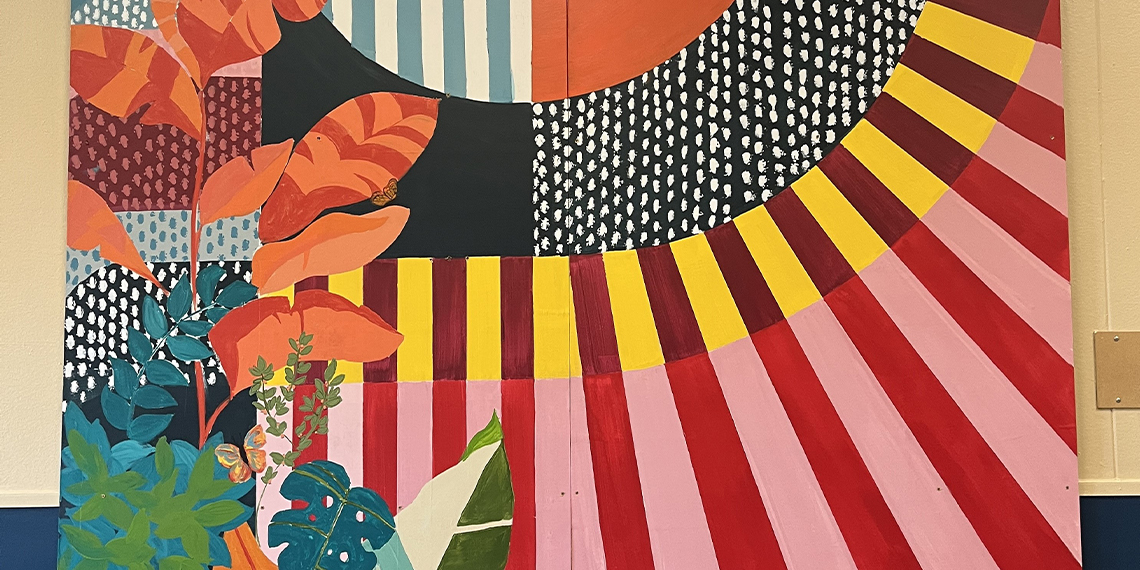“It’s all about respect, acceptance, and education.”
Community Profile of Manzanita House

As I enter the Manzanita House’s office, what immediately stands out is the color. Nestled in a professional space above a church, I was expecting something drab, cluttered, and decidedly gray. But the space I am in now resembles a welcoming living room adorned with a homemade tapestry, comfortable couches, and a full bookcase.
Co-founder Patricia Castaneda, or Pat, invites us to sit down on the couches and pulls out her own chair. My colleague Sammy facilitates the introductions and begins the interview.
On its website, Manzanita House describes itself as a community nonprofit that provides legal aid to immigrants, in addition to community resources with plans to expand in the future. I had assumed that the focus of the organization was legal aid and took the community resources component as secondary. Pat’s answers to my colleague’s questions quickly dispels that notion.
For an organization founded under three years ago, the scope of its current programs and ambitions speak to an unwavering focus on legal aid, cultural education, and professional development. Pat walks us through three of these endeavors: a legal aid program executed by attorney Samuel Smith, who helped around 386 people from 49 countries in the organization’s first year; a budding Language Program which enlists community volunteers to teach Arabic, Farsi, and Marshallese to children up to age 17; and the Cultural Education and Implementation Program, which equips businesses with the cultural and professional competencies to work with immigrants and refugees.
The Manzanita House takes a multifaceted approach to strengthening community, as illustrated by these programs. But it is individuals who comprise communities, and Manzanita House recognizes that caring for the individual allows for stronger communities. As such, a focus on mental health complements the nonprofit’s mission. “We also wanted [from the beginning] to work with mental health,” Pat recalls. This manifested early in the organization’s journey through providing legal aid to guide people through the stressful citizenship process. “Having a better experience with your legal status will definitely help [your mental health],” Pat elaborates.
Moving forward, Manzanita House plans to offer culturally conscious mental health resources. This decision provides for a critical need which often emerges from the immigrant and refugee experience. Culture shock, grief, and traumatic experiences are all too familiar for those fleeing countries destabilized by natural disasters, violence, and economic collapse.
At this point in the interview, the homey décor and Pat’s warm demeanor find greater context. Sitting on the couch listening, I feel oddly inspired and nostalgic in this space, by these people, realizing just how special Manzanita House truly is.
One of the most touching moments of the interview involves Manzanita House’s Tea Times, where women are invited to spend time together as their children participate in language classes. “We want that space to be theirs, to do whatever they want,” Pat emphasizes. “If they wanna gossip, then gossip. If they wanna drink tea and do nothing, do it.” She smiles. “They feel that we are family.
They come and they say, ‘I cooked this last night. You have to try it.’”
Samantha, Manzanita House’s Coordinator for the Language Program, shares her own stories from Tea Times. She fondly recalls a moment where the group took turns cradling a mother of the group’s newborn baby. Pat and Samantha take turns reminiscing over sweet memories like families showing up early and unprompted to help organize events, or ladies hiding secret stashes of sweets for Samantha to put in her car. The laughter between the two becomes so infectious that Sammy and I begin to giggle.
Once we all regain our composure, Pat reveals the organization’s many plans: a larger gathering space for community events, a centralized building as opposed to the current three separate offices, and even more languages offered in the program.
Organizations like Manzanita House hold unquestionable importance in any city, but especially Spokane. Around 700 refugees per year come into Spokane, alongside immigrants moving from other states in search of a new home. In the interview, my colleague Sammy explores the obstacles and responsibilities of community building with Pat.
The latter is no stranger to ignorance and prejudice. She cites a recent incident at a restaurant as a moment which informs her outlook on these issues. The waiter had made several stereotyping comments and jokes which made Pat and her friends extremely uncomfortable. The incident resolved itself once the waiter acting disrespectfully was made aware of this fact. They admitted their own inexperience, explaining that they felt insecure when addressing such a diverse group of people. “You don’t know what you don’t know,” Pat explains. “[People are] ignorant because they haven’t had the opportunity or the time in their own life to learn.”
This places Manzanita House in a crucial position for the broader Spokane community moving forward. Nonprofits are not responsible for individuals’ education and overcoming of prejudice, but Manzanita House’s versatile programs certainly offer accessible resources to learn, “being able to get that information without feeling like they have to take a college course,” as Pat puts it.
“It’s all about respect, acceptance, and education.” If there’s anything to take away from my experience with Manzanita House, these three values are worth writing on the fridge. The love and passion of Pat, Samantha, and the rest of Manzanita House has made a lasting impression and given me hope for the future of our city.
- Opportunity Northeast




